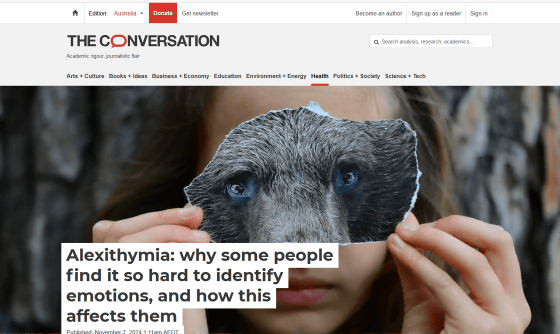What is Alexithymia, the inability to understand one's own emotions?

Many people can recognize what emotions they are feeling and express them in words to others. However, some people have difficulty recognizing and expressing their emotions, and this tendency or disorder is called
Alexithymia: why some people find it so hard to identify emotions, and how this affects them
https://theconversation.com/alexithymia-why-some-people-find-it-so-hard-to-identify-emotions-and-how-this-affects-them-240480

Alexithymia refers to a tendency to have difficulty recognizing one's own emotions, distinguishing between emotions such as 'happiness' and 'sadness,' and expressing one's own emotions. This is a problem that is deeply related to relationships and interactions with those around you, but because it is a very internal problem, there are often no visible differences to others. In addition, sometimes people with alexithymia are not even aware that they have it.
The term alexithymia is a combination of the Greek words 'a' (without), 'lexis' (word), and 'thymia' (soul or emotion), and roughly translates to 'no words for emotions.' In Japanese, it is also translated as 'alexithymia,' but it simply means that the person is unable to interpret and express emotions, not that they have no emotions at all.
Alexithymia was first described in studies in the 1970s, and although there are no clinical diagnostic criteria at the time of writing, it is estimated that around 10% of the population has alexithymia.
The ability to perceive various internal states of the body is called interoception , and people with impaired interoception have difficulty determining whether they are hungry, thirsty, tired, excited, in pain, etc. Ellis says that alexithymia is closely related to interoception.

Previous research has shown
Because people with alexithymia don't know what they're feeling, they are more likely to suppress or ignore their sadness or anger, and are less likely to act or think to solve problems. This makes it harder for people with alexithymia to emotionally regulate themselves and makes them more likely to feel mentally overwhelmed.
One of the characteristics of people with alexithymia is an 'externally oriented thinking style,' according to Ellis. This refers to a tendency to focus on what is happening around them, rather than on their own emotional processes when it comes to information. In other words, because people with alexithymia do not understand their own emotions, they tend to evaluate things based on 'what was happening around them' and choose behavior that adapts to them.
For people with autism, alexithymia can make it difficult to interpret social cues, such as facial expressions, which can lead to problems such as confusion and exhaustion. They may also react differently to events that evoke similar emotions in many people, such as the death of a celebrity or a marriage announcement. Reacting inappropriately to the emotions of others can lead to misunderstandings and frustration for those involved.

Noticing a physical sensation, identifying it as a particular emotion, and deciding how to respond is something that many people do naturally. Knowing about alexithymia and understanding when someone is having difficulty is important in determining what kind of support they need.
'Alexithymia can affect a person's connection to their emotions, but emotion recognition is a skill that can be developed in adulthood and improved over time,' Ellis said. 'One strategy that can help people with alexithymia understand themselves better is to practice naming emotions and bodily sensations. Another strategy is to identify how these emotions are expressed in the body.' He argued that people with alexithymia can improve their emotion recognition skills with training.
Related Posts:
in Science, Posted by log1h_ik







